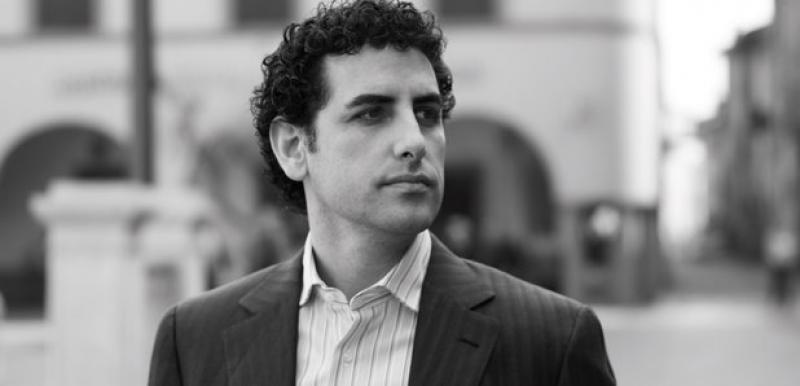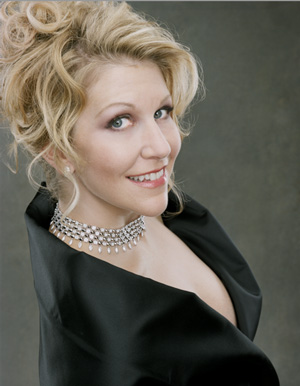Juan Diego Flórez and friends, Barbican Hall | reviews, news & interviews
Juan Diego Flórez and friends, Barbican Hall
Juan Diego Flórez and friends, Barbican Hall
With a little help from his friends Juan Diego Flórez gives his finest London recital yet

It takes a certain kind of artist to book American mezzo-extraordinaire Joyce DiDonato as a supporting act. It’s a risk. Even if you happen to be Juan Diego Flórez. But it’s one that actually paid off on the first night of Flórez’s three-concert residency at the Barbican.
Joined not only by DiDonato but by soprano Julia Novikova and baritone Marco Caria (as well as the massed forces of the LSO), Flórez showed us a softer side than the bravado-recitalist we usually see during his London visits. Surrounded by his peers, duetting, quartetting and generally sharing the spotlight, Flórez rather paradoxically came into focus in a way I’ve rarely seen outside the opera house.
Flórez's performance of the Duke’s arias from Rigoletto made you long to see him in the role
Perhaps it’s the challenge of matching a singer like DiDonato, or greater familiarity with the operatic rather than song repertoire. Perhaps it’s just that performing with colleagues takes some of the rigidity out of the recital process. But whatever the cause, Flórez sang more freely and with greater commitment to character than he has previously demonstrated in London, offering his audience an evening of operatic lollipops that smuggled in a surprising amount of drama and no little musical interest along with its big tunes and top notes.
Very little of which interest came courtesy of conductor Guillermo García Calvo (a late replacement for Karel Mark Chichon) or the London Symphony Orchestra. For a symphony orchestra with a fighting claim to being London’s finest, the LSO certainly do a good impression of the worst. Smudged entries, ensemble issues, tempo madness and tuning disagreements were rife; presumably a programme of bel canto overtures and famous arias was the least of their priorities this week in allocating rehearsal time, but the result was cheap and needlessly scruffy. Music from Rigoletto and I vespri Siciliani was a late high-point, but by that time we’d been so baffled and battered by music from L’elisir d’amore and La Cenerentola that it struggled to make its impact.
 Flórez himself appeared as an unexpectedly ardent lover, crooning his way through a faultless “Una furtiva lagrima” with the help of a plangent solo bassoon, and offered us a wonderfully dramatic triptych of moods and contrasting tone colours in “Popoli dell’egitto” from Meyerbeer’s forgotten Il Crociato in Egitto. His performance of the Duke’s arias from Rigoletto made you long to see him in the role, but despite all this it was still the memory of DiDonato’s “Se Romeo” from Bellini’s I Capuletti e i Montecchi that lingered as we left the Barbican Hall (Donato pictured right).
Flórez himself appeared as an unexpectedly ardent lover, crooning his way through a faultless “Una furtiva lagrima” with the help of a plangent solo bassoon, and offered us a wonderfully dramatic triptych of moods and contrasting tone colours in “Popoli dell’egitto” from Meyerbeer’s forgotten Il Crociato in Egitto. His performance of the Duke’s arias from Rigoletto made you long to see him in the role, but despite all this it was still the memory of DiDonato’s “Se Romeo” from Bellini’s I Capuletti e i Montecchi that lingered as we left the Barbican Hall (Donato pictured right).
While baritone Caria failed to make much of a mark (fighting an already-lost battle for dramatic supremacy with Flórez in the Belcore/Nemorino duet “Venti scudi”), Novikova did rather better. If her “Je veux vivre” was emotionally a little overripe, and her Gilda a little too knowing, there was no arguing with the evenness of her tone, nor her projection, which emerged well in the balance of the Rigoletto quartet – a triumphant and satisfyingly substantive finale after so much musical fluff.
Next week we’ll have the chance to see Flórez the solo-artist and Flórez the vocal coach, but whatever happens the residency has already offered us something new and valuable – a chance to see this stage animal in something more akin to his natural habitat, while keeping all the concert hall’s advantages of intimacy and proximity. A Flórez concert is always a party, and this was no exception, ending in two encores and cheers that belonged in a stadium rather than a recital hall. The superstar tenor certainly gave us all a good time, and on a chilly Sunday night in April there’s a lot to be said for anyone peddling the easy sunshine of Donizetti and the careless ardours of Gounod and Rossini.
rating
Explore topics
Share this article
Add comment
The future of Arts Journalism
You can stop theartsdesk.com closing!
We urgently need financing to survive. Our fundraising drive has thus far raised £49,000 but we need to reach £100,000 or we will be forced to close. Please contribute here: https://gofund.me/c3f6033d
And if you can forward this information to anyone who might assist, we’d be grateful.

Subscribe to theartsdesk.com
Thank you for continuing to read our work on theartsdesk.com. For unlimited access to every article in its entirety, including our archive of more than 15,000 pieces, we're asking for £5 per month or £40 per year. We feel it's a very good deal, and hope you do too.
To take a subscription now simply click here.
And if you're looking for that extra gift for a friend or family member, why not treat them to a theartsdesk.com gift subscription?
more Opera
 La bohème, Opera North review - still young at 32
Love and separation, ecstasy and heartbreak, in masterfully updated Puccini
La bohème, Opera North review - still young at 32
Love and separation, ecstasy and heartbreak, in masterfully updated Puccini
 Albert Herring, English National Opera review - a great comedy with depths fully realised
Britten’s delight was never made for the Coliseum, but it works on its first outing there
Albert Herring, English National Opera review - a great comedy with depths fully realised
Britten’s delight was never made for the Coliseum, but it works on its first outing there
 Carmen, English National Opera review - not quite dangerous
Hopes for Niamh O’Sullivan only partly fulfilled, though much good singing throughout
Carmen, English National Opera review - not quite dangerous
Hopes for Niamh O’Sullivan only partly fulfilled, though much good singing throughout
 Giustino, Linbury Theatre review - a stylish account of a slight opera
Gods, mortals and monsters do battle in Handel's charming drama
Giustino, Linbury Theatre review - a stylish account of a slight opera
Gods, mortals and monsters do battle in Handel's charming drama
 Susanna, Opera North review - hybrid staging of a Handel oratorio
Dance and signing complement outstanding singing in a story of virtue rewarded
Susanna, Opera North review - hybrid staging of a Handel oratorio
Dance and signing complement outstanding singing in a story of virtue rewarded
 Ariodante, Opéra Garnier, Paris review - a blast of Baroque beauty
A near-perfect night at the opera
Ariodante, Opéra Garnier, Paris review - a blast of Baroque beauty
A near-perfect night at the opera
 Cinderella/La Cenerentola, English National Opera review - the truth behind the tinsel
Appealing performances cut through hyperactive stagecraft
Cinderella/La Cenerentola, English National Opera review - the truth behind the tinsel
Appealing performances cut through hyperactive stagecraft
 Tosca, Royal Opera review - Ailyn Pérez steps in as the most vivid of divas
Jakub Hrůša’s multicoloured Puccini last night found a soprano to match
Tosca, Royal Opera review - Ailyn Pérez steps in as the most vivid of divas
Jakub Hrůša’s multicoloured Puccini last night found a soprano to match
 Tosca, Welsh National Opera review - a great company reduced to brilliance
The old warhorse made special by the basics
Tosca, Welsh National Opera review - a great company reduced to brilliance
The old warhorse made special by the basics
 BBC Proms: The Marriage of Figaro, Glyndebourne Festival review - merriment and menace
Strong Proms transfer for a robust and affecting show
BBC Proms: The Marriage of Figaro, Glyndebourne Festival review - merriment and menace
Strong Proms transfer for a robust and affecting show
 BBC Proms: Suor Angelica, LSO, Pappano review - earthly passion, heavenly grief
A Sister to remember blesses Puccini's convent tragedy
BBC Proms: Suor Angelica, LSO, Pappano review - earthly passion, heavenly grief
A Sister to remember blesses Puccini's convent tragedy
 Orpheus and Eurydice, Opera Queensland/SCO, Edinburgh International Festival 2025 review - dazzling, but distracting
Eye-popping acrobatics don’t always assist in Gluck’s quest for operatic truth
Orpheus and Eurydice, Opera Queensland/SCO, Edinburgh International Festival 2025 review - dazzling, but distracting
Eye-popping acrobatics don’t always assist in Gluck’s quest for operatic truth

Comments
What no mention on this web
Pace Tenorissimo: Alexandra